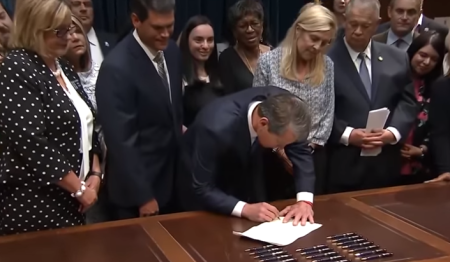Georgia Supreme Court upholds heartbeat abortion ban, reverses lower court ruling

The Georgia Supreme Court has upheld the state's heartbeat law banning abortions after a baby's heartbeat can be detected, usually around six weeks of gestation.
In an opinion last week, Georgia's top court upheld the state's Living Infants Fairness and Equality (LIFE) Act in a 6-1 ruling, reversing a November 2022 lower court ruling from Fulton County Superior Court Judge Robert McBurney that prevented the state from enforcing the law.
The law bans most abortions after an unborn baby has a detectable heartbeat but allows abortions in some cases of rape or incest, or to save the mother’s life.
Writing for the majority, Georgia Supreme Court Justice Verda Colvin dismissed the lower court's assertion that "'controlling Georgia precedent' required it to assess the LIFE Act's constitutionality based on 'the legal environment that existed'" when the measure was enacted. Since the law was passed in 2019, at a time when the Roe v. Wade decision that legalized abortion nationwide was the controlling Supreme Court precedent on abortion, the trial court concluded that the law was unconstitutional.
The 2022 Dobbs v. Jackson Women's Health Organization decision overturned Roeby "holding that 'the [United States] Constitution does not confer a right to abortion."
"The United States Constitution means today what it meant when the LIFE Act was enacted in 2019, even if the United States Supreme Court's interpretation of the Constitution has changed," Colvin wrote.
The judge contends that the trial court "erred" by concluding by ruling against the LIFE Act even though it "complies with the United States Constitution today."
"The same United States Constitution governs today as when the LIFE Act was enacted, and Georgia courts are required to look to the United States Supreme Court's now-controlling interpretation of the United States Constitution when determining whether a statutory law violates that Constitution," Colvin stressed.
"Because Dobbs is controlling precedent on whether the United States Constitution confers a right to abortion, and because the parties and the trial court do not dispute that the LIFE Act complies with Dobbs, it follows that the LIFE Act did not violate the United States Constitution when enacted in 2019."
The opinion enables the state to enforce the law and remands the case back to the lower court for "further proceedings consistent with this opinion."
Pro-life advocacy groups released statements in support of the decision, while pro-abortion advocates decried the ruling.
Mat Staver, founder and chairman of the Christian conservative legal organization Liberty Counsel, called the decision "the fruit of the righteous U.S. Supreme Court decision to overturn Roe v. Wade eliminating so-called abortion rights."
Contending that "every person has an inalienable right to life" and that "pro-life laws protect innocent unborn babies," Staver declared in a statement, "It is time for all states and courts around the nation to follow suit and make the womb a safe place again."
Georgia Life Alliance Executive Director Claire Bartlett expressed gratitude for "the political will shown by Georgia's pro-life elected officials, including Governor Brian Kemp, Senator Ed Setzler, Labor Commissioner Bruce Thompson and Senator Renee Unterman (ret.) who all fought for the LIFE Act's passage in 2019."
Alexis McGill Johnson, president and CEO of Planned Parenthood, the largest abortion provider in the U.S., called it "a tragic day for reproductive freedom and for patients in Georgia."
"Across the southeast, abortion bans have decimated access to care and made pregnancy more dangerous," she said in a statement. "People seeking abortion beyond the earliest stages of pregnancy will continue to have their lives upended by the cruelty of this law and the out-of-touch politicians that passed it. We cannot and will not stand idly by — Georgians deserve better. We will continue this fight until everyone who needs abortion care can access it, free from political interference and needless hurdles."
Marjorie Dannenfelser, president of the pro-life group Susan B. Anthony Pro-Life America, praised the decision for ensuring that "tens of thousands of children with beating hearts will continue to be protected from brutal abortions."
"It is the latest vindication of the will of Georgians, who have compassion for both babies and mothers, along with lawmakers like Governor [Brian] Kemp and many others who heard them and acted," she added. "We congratulate Governor Kemp, Attorney General [Chris] Carr, all our local allies, and the people of Georgia on a long and well-fought battle. Life is winning in hearts and minds nationwide. When you lead and stand boldly for life, Americans will stand with you."
According to Dannenfelser, half of U.S. states have "pro-life protections in their law" in what she called the "new Dobbs era." Susan B. Anthony Pro-Life America estimates that 20,055 babies will be saved from abortion on an annual basis as a result of Georgia's LIFE Act.
Ryan Foley is a reporter for The Christian Post. He can be reached at: ryan.foley@christianpost.com





















